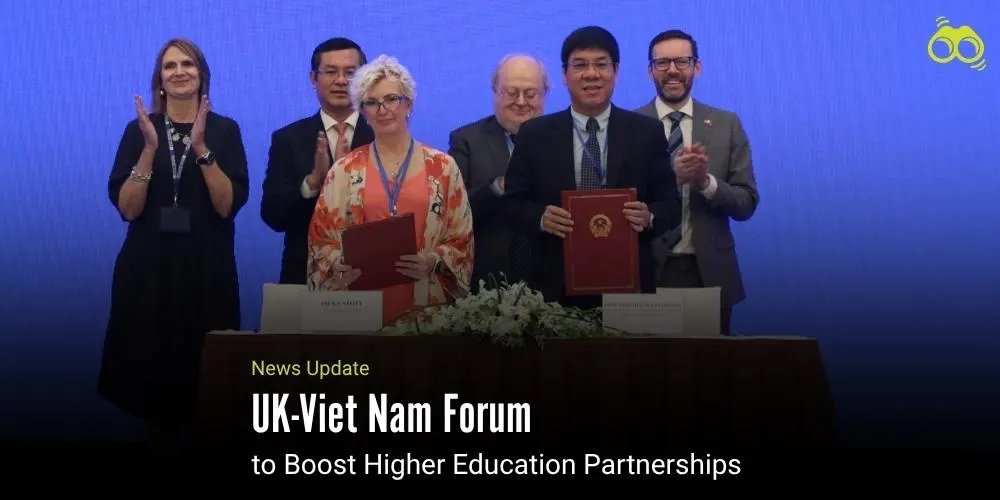Ministry of Education and British Council Lead Strategic Talks on Global Education
UK–Viet Nam Forum Highlights Education Policy, Research, and Student Mobility
In a significant step towards strengthening the international academic ties, London is set to host a high-level forum this October, mainly focused on advancing higher education cooperation between the United Kingdom and Viet Nam. The forum was co-organised by the British Council and the Viet Nam Intellectual Society of the UK and Ireland (VIS). The event is expected to bring together leading voices from UK universities, Vietnamese institutions and global education networks to explore strategic partnerships centred on talent development, innovation and long-term global impact.
Taking place on Friday, 31 October 2025, the forum will be at St. James' Place, 30 Lombard Street, central to the City of London. It has been characterised as a working platform where Vietnamese leaders in higher education will come together with their London, UK university, business, and organisational counterparts to share ideas, reinforce networks, and look into long-term partnerships in science, technology, and innovation.
The project is reported to capture increased interest in education and higher education collaborations between the UK and Viet Nam, including in the field of college education, collaborative research, and the sharing of student data. Participants will apparently learn about Vietnam's changing education department strategy and regulation environment, which will enable forthcoming collaborations with UK institutions.
The highlight of the event will be the launch of the UK-Vietnam iTechPath, which is a four-year programme directed by the British Council in Vietnam. This programme focuses on enhancing the quality of programmes in Vietnamese universities, building high-level human resources and developing sustainable partnerships through talent generation, staff and student engagement and collaborative research in priority areas.
Participants will include representatives from the Ministry of Education and Training of Vietnam (MOET), the Embassy of Vietnam in the UK, leading Vietnamese universities, the UK Department for Business and Trade (DBT), and various London universities, alongside education experts and business leaders. The event is expected to generate new opportunities for collaboration and contribute to the wider landscape of education articles and policy dialogue between the two countries. The forum is being regarded as a timely and strategic move in furthering the Department of Education's higher education objectives, while supporting the UK's leadership position in the shaping of global education partnerships. The forum is also demonstrating a combined commitment to innovation, talent development, and inclusive academic growth across borders.
Editor's Note:
This online forum is a considerate and timely initiative to enhance scholarly collaboration between Viet Nam and the United Kingdom. In an era when international education is confronting opportunity as well as uncertainty, forums like this one hold more than symbolic significance; they present tangible pathways for cooperation, creativity, and mutual advancement. The initiation of the UK–Vietnam iTechPath is especially heartening. It is a sign of a long-term approach to talent development and quality education in Vietnamese universities, and indeed more widely across the region. The fact that it involves student exchange, collaborative research, and regulatory dialogue indicates a serious commitment to a sustainable partnership. But the success of such endeavours will also depend on the extent to which they reconcile strategic ambition with equity of access. International cooperation must work for both excellence and equity. With proper care, this forum could help create a more linked and resilient higher education system, one that serves institutions, students, and societies in both regions.
Skoobuzz underlines that this forum is a step in the right direction. With continued effort and shared purpose, it can help build a stronger, fairer future for higher education in both Viet Nam and the UK.
FAQs
1. How is the UK strengthening education ties with Vietnam?
The UK is building stronger education links with Viet Nam by organising forums, launching joint programmes, and encouraging partnerships between universities. Events like the UK–Vietnam higher education forum in London help both countries share ideas, plan joint research, and support student and staff exchanges.
2. What are the benefits of UK–Vietnam higher education partnerships?
These partnerships help improve the quality of university education, offer students more global opportunities, and support innovation in science and technology. They also help both countries develop skilled workers and build long-term academic and business connections.
3. Which UK universities collaborate with Viet Nam?
Many UK universities, especially those based in London and other major cities, work with Vietnamese institutions. These include universities involved in research, student exchange, and joint academic programmes. The British Council often helps connect these universities with partners in Vietnam.
4. How does higher education in the UK compare to Viet Nam?
Higher education in the UK is known for its strong research, wide range of courses, and global recognition. Vietnam’s system is growing quickly, with more focus on international standards and partnerships. While UK universities often have more resources and global reach, Vietnamese universities are working hard to improve quality and expand access.
5. What role does the UK Ministry of Education play in international partnerships?
The UK Ministry of Education helps set policies that support global collaboration. It works with other departments, like the Department for Business and Trade, to promote UK education abroad. It also supports programmes that encourage partnerships, student mobility, and shared research between UK universities and international institutions.














0 Comments (Please Login To Continue)